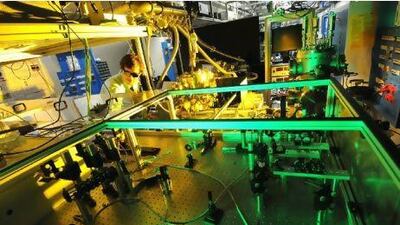DUBAI // Scientists are hoping to radically alter the molecular arrangement of substances by zapping them with ultra fast laser bursts.
Dr Ali Al Naser, an associate professor of physics at the American University of Sharjah, last monthbegan a year-long research project in Germany into the possibility of transforming substances at an atomic level by using ultra high-power short-pulse lasers.
His research is based on a new area of physics which studies how lasers can disrupt the bonds between electrons, causing chemical reactions.
Hydrocarbons are carbon atoms combined with hydrogen atoms. Many of them are used as fuels - from short-chained gases like methane, to longer-chained oils and very long-chained waxes. Changing the number of carbon atoms and hydrogen atoms, and the way they are bonded, results in different hydrocarbons with different properties.
He said it might be possible to more efficiently transform certain hydrocarbons - for example, turning ethane, which consists of two atoms of carbon and six of hydrogen, into the more usable ethylene, which has just four hydrogen atoms and a double bond between the carbons.
It would, says Dr Al Naser, be the first time the conversion has been achieved with lasers.
His research proposal attracted the attentions of the Arab Fund for Economic and Social Development, which awarded him $60,000 for living costs and expenses during a one-year sabbatical at the Max Planck Institute of Quantum Optics, in Munich.
The research is part of a field of cutting-edge physics that has reshaped theories of quantum mechanics.
Its basis is the study of how the electromagnetic field in a laser pulse can become the same order of magnitude, or greater, than that of a Coulomb field, which binds atoms in their orbits. If the magnitude is less, the laser will not be able to sufficiently excite the atom. The presence of this field can create unimaginably quick changes in the structure of the atom.
In the past decade, scientists have developed lasers that release pulses of light just one attosecond long - a millionth of a millionth of a millionth of a second. (For scale, there are as many attoseconds in one second, as there are seconds in 31 billion years.)
The pulses need to be that fast to disrupt molecules - one rotation of an electron around the nucleus of an atom takes just a few hundred attoseconds. The effect is to cause super-fast disruptions in the arrangement of an atom.
Now the challenge for Dr Al Naser is to find a way to calibrate the laser pulses so the molecular changes happen in a predictable way. "If the substance can go 10 different routes, we are hoping to adjust the laser's parameters so we can create a preferred route," he said.
As well as changing the molecular structure of hydrocarbons, the technique could be used to transform harmful substances such as carbon monoxide into something less toxic.
"These molecules are toxic because the way they are bound and the number of atoms that exist in the substance," Dr Al Naser said. Since you have control with lasers, you can determine how you can remove the toxic quality of the substance by changing the way these atoms are combined, or removing a number of charged particles in the target."
One of the leading researchers in this field has been Ahmed Zewail, an Egyptian-American scientist who won the Nobel Prize for Chemistry in 1999. He used an ultra-fast laser to manipulate chemical reactions in the time range of femtoseconds (one femtosecond is 1,000 attoseconds). His field of research became known as femtochemistry.
The science was taken further by Dr Ferenc Krausz, of the Planck institute in Munich, whose team in 2001 developed the first attosecond pulse laser.
With it, they were able to observe a quantum-level process in which electrons "tunnel" out of an atom - first predicted in 1965 by the Russian physicist Leonid Keldysh.
In the process, negatively charged atoms absorb a high-energy photon from the ultraviolet spectrum, which excites them to the point they are able to break free of the orbit of the positively charged nucleus.
Dr Al Naser, who will be collaborating with Dr Krausz in his sabbatical year, has been working on attosecond science since 2003. In some of his earliest research, he collaborated on a project with Dr Igor Litvinyuk, who is now an associate professor of physics at Griffith University in Brisbane, Australia.
"These lasers are very expensive and they are difficult to access," Dr Litvinyuk said. "That can inhibit research in many parts of the world. It would be excellent if Ali was able to facilitate the building of a laser like this in the Middle East."
Dr Litvinyuk's research has been geared towards atomic-level attosecond science, while Dr Al Naser is more interested in the behaviour of molecules. Of particular interest was fuel combustion and the associated need to improve both efficiency and reduce harmful byproducts.
It is still not clear his techniques will ever be useful on an industrial scale.
"To be honest, we don't even know if it will work on the small scale," Dr Litvinyuk said. "That's something we want to study. The science is still very new and this is something we are going to be studying for a long time."

